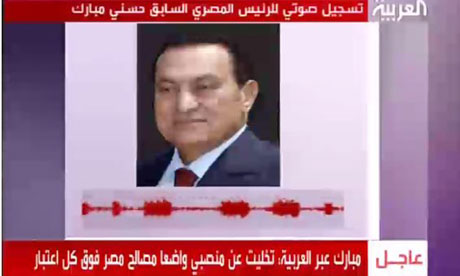Hosni Mubarak insists he did nothing wrong as Egypt's president
In his first public address since leaving power, deposed leader denies stealing billions of dollars from the state and says accusations of corruption are 'a lie'

Hosni Mubarak on the al-Arabiya satellite news channel. 'I will uphold all my legal rights to defend my reputation as well as that of my family' Photograph: AL ARABIYA / HANDOUT/EPA
Egypt's deposed former president, Hosni Mubarak, has made his first public statement since leaving power to deny he stole billions of dollars from his country's coffers. The statement, via al-Arabiya satellite news channel, came hours before he was summoned by prosecutors examining corruption and the killing of pro-democracy protesters.
Egypt's public prosecutor also had Mubarak's former prime minister, Ahmed Nazif, detained for 15 days as part of the investigation.
The moves by the prosecutor appear to be a response by the country's military rulers to a new wave of mass protests in Cairo over the weekend to demand action against Mubarak and other high former officials for corruption, and for more immediate steps toward democratic government.
At least two people were killed and dozens wounded after the army opened fire on hundreds of demonstrators who were threatening a new revolution and refusing to leave Cairo's Tahrir square, the epicentre of the movement against Mubarak in February.
In his first public address since he was deposed, Mubarak called any accusations of corruption against him or his family "a lie".
"I will uphold all my legal rights to defend my reputation as well as that of my family," he said. "I have been, and still am, pained by what I and my family are facing from fraudulent campaigns and unfounded allegations that seek to harm my reputation, my integrity and my military and political record."
Speaking on al-Arabiya in a speech recorded on Saturday, Mubarak said he will cooperate with any investigation in order to prove that he does not have property or bank accounts abroad. He also denied similar accusations against his wealthy and once powerful sons, Alaa and Gamal, who have also been summoned for questioning.
But Mubarak made no mention of the parallel investigation of his role in the deaths of more than 360 people at the hands of the police, army and political militia during the mass protests that brought down the Egyptian leader.
The public prosecutor, Abdel Maguid Mahmoud, said that Mubarak's rejection of the corruption accusations against him and his family would have no effect on the investigation.
Mahmoud said that Nazif had been detained as part of investigations into squandering of public funds. The public prosecutor also announced he had sequestered land belonging to the Saudi billionaire, Prince Alwaleed bin Talal at Toshka, in the south of the country which is part of a desert reclamation project.
The ruling military council, which took control after Mubarak fell on 11 February, also attempted to defuse the new wave of popular protests by announcing that it will sack unpopular provincial governors appointed by Mubarak.
But more than 1,000 demonstrators rejected demands by the army for them to leave Tahrir square as they pressed for action against the former president and a more swift transition to democracy.
On Friday, tens of thousands of people turned out in the square for the largest protest since the rallies against Mubarak's rule. When thousands remained in the square the next day in defiance of the military's orders to leave, soldiers provoked further outrage by opening fire. Some of the demonstrators who remained in the square yesterday, barricaded behind barbed wire and burned-out troop carriers, called for a new revolution and brandished an effigy of the head of the ruling military council, Field Marshal Mohamed Hussein Tantawi.
"The people demand that the field marshal be toppled," the protesters chanted.
The soldiers firing on the protesters opens a breach between the military and many Egyptians who had chanted "the people and army are one" at the anti-Mubarak rallies. On Saturday they chanted "the people and people are one" in an open rebuke to the military which some Egyptians who backed February's revolution say is not moving swiftly enough to dismantle the old regime and toward democracy.
The army has promised elections for parliament in September and held a referendum on a new constitution which passed. But it has attempted to ban protests and continues to arrest and torture dissidents despite a professed commitment to freedom of speech.
Ahmed el-Moqdami, who told Reuters he was in a group representing the youth of Upper Egypt, said that the stand-off with the army will continue.
"We will continue the sit-in until our demands are met," he said. "First of all, the field marshal must go. Mubarak must be put on trial and a civilian council must be formed for the transition period."
The military has barred Mubarak, 82, from leaving the country while the investigations continue. He has been living in the Red Sea resort of Sharm el-Sheikh.
No comments:
Post a Comment